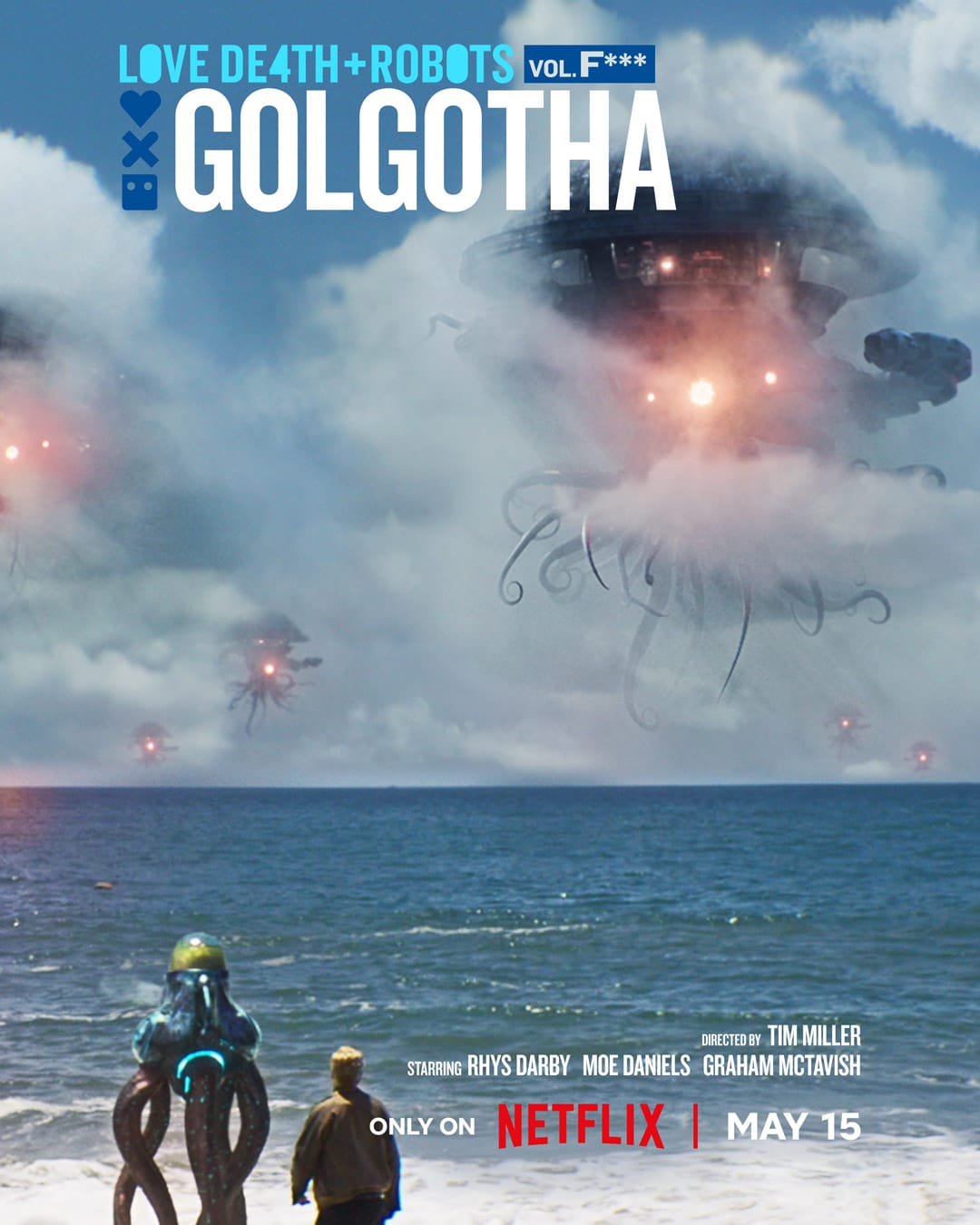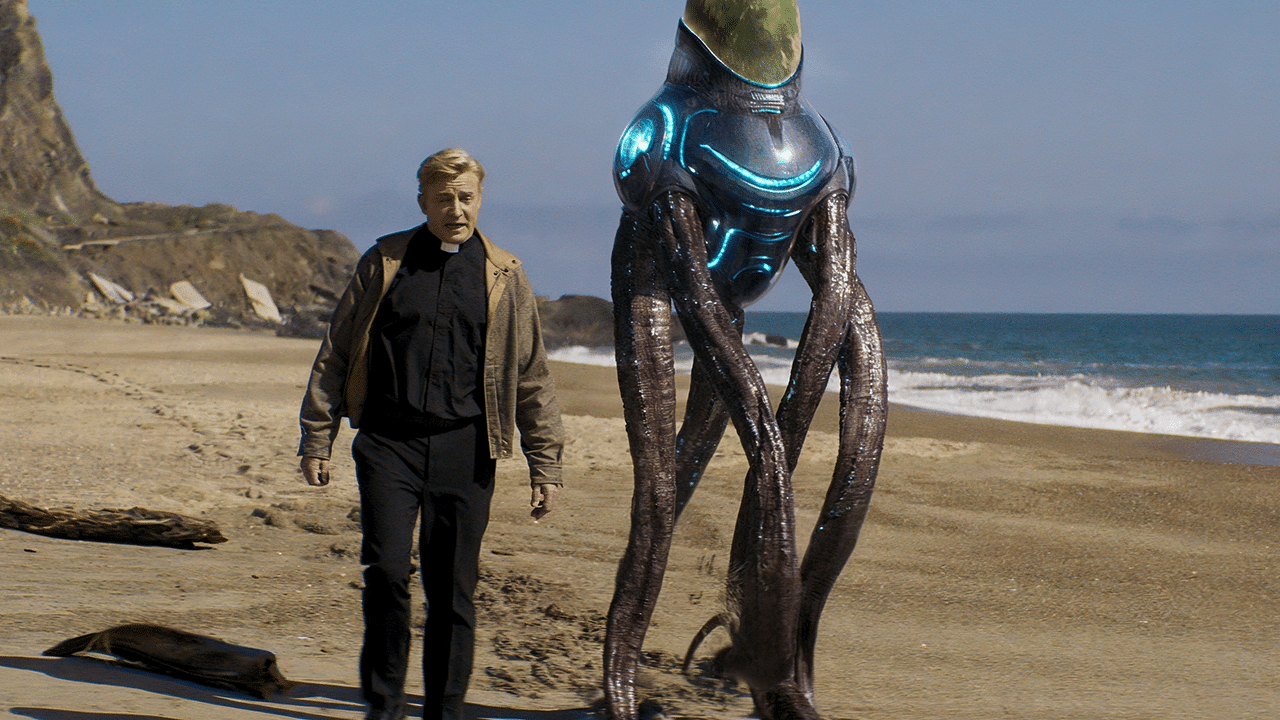Picture: Netflix
Short and to the point, Golgotha is the second rare live-action entry in the Love, Death and Robots franchise, following Ice Age in Volume 1. Starring Rhys Darby, Moe Daniels, Graham McTavish, Phil Morris, Michelle Lukes, Matthew Waterson, the new episode is directed by Tim Miller (who also serves as the series creator and EP) with a script adapted by British writer Joe Abercrombie, bringing to life a short story by Dave Hutchinson.
Aliens have touched down on Earth. Dubbed an aquatic creature, the alien is said to come from a gaseous world. It sports a metal casing around its head and octopus-like legs that help it shuffle along the beachside. The alien comes from a gas giant 50 light years away and is believed to be well ahead of humanity in terms of technology.
The story opens up with a priest talking to his Bishop as they drive along the Irish coast to where the aliens have been found before. Not wanting to talk to military leaders or heads of government, it only wants to talk to one person: the man who saved a dolphin’s life and witnessed the Blackfin’s “resurrection.”
Said to be a religious race, it’s clear early on that they don’t quite understand the nuances of us humans. Arriving on the beach full of media and military personnel, Donal is told that the church still doesn’t have an official position regarding the aliens, known as Lupo. The bishop tells him, “Don’t fuck it up.”
After a short briefing from the four-star general on the ground, the priest is sent down to liaise with Lupo, who has requested his presence. The alien seems to be aware of a story from a few years prior about a group of dolphins (called a pod) who were found washed up ashore after being devastated by an oil spill. Miraculously, one had survived, and the papers, and perhaps even Donal, got a bit carried away and called it a miracle resurrection.
Looking for Blackfin, the dolphin that came back to life, the Lupo sends out a piercing, high-pitched signal to call upon the dolphin, who eventually arrives. Once it does, the Lupo tells the priest to kneel for the Messiah. They then have a brief conversation, and the Blackfin talks to Lupo about humanity and our sins. “She gives a testament of rampant murder,” Lupo says, growing frustrated, although there’s little the priest can really say. He fucked up. “And so, our crusade begins.” Alien ships appear on the horizon and kill everyone based solely on their interaction with Blackfin.
There are a few lessons and themes here. Nuance is certainly one of them, given that the alien, although able to speak in English (and dolphin, for that matter), clearly does not understand the nuances and frame of reference, taking the resurrection of Blackfin literally and everything it says henceforth as gospel. As for our priest, this was a runaway train, and very little he could’ve said or done would ultimately matter.

How does the short story differ from the short? What can we learn about the Alien from the short story?
Originally in 2001: An Odyssey in Words, a collection of 27 short stories from authors like Neil Gaiman, China Miéville, Bruce Sterling, Alastair Reynolds, and in relation to this LD+R episode, Dave Hutchinson.
The short story, clocking in at exactly 2,001 words, largely aligns with the events of the episode but offers a few notable insights that deepen the world. It refers to Blackfin’s message to the Lupo as the “Word of the Lupo God,” adding a significant religious weight to his influence, far beyond that of an actual priest. Additionally, it reveals that Blackfin had gained a kind of celebrity status, becoming something of a local legend and even a well-known tourist attraction.
The short story delves a little more into the resurrection miracle, although it’s plainly more a case of luck than divine intervention.
It’s also noted in the short story how the priest actually did very little to combat the misinformation of Blackfinn’s miracle resurrection, given that it actually led to an increase in membership in his congregation, which helped because up until that point, the coffers were running dry. Because of this and the importantance and indeed the symbolism of miracles in religion, Lupo takes the dolphin’s word as gospel and although all-out war doesn’t actually begin in the short story like it does in the episode, the priest concedes by the end, “I had not only fucked up; I had a terrible feeling that I had witnessed the beginning of a crusade.”
Ultimately, the episode explores themes of faith, misunderstanding, the fragile balance between humanity and nature, and how simple misinformation can have profound consequences.















